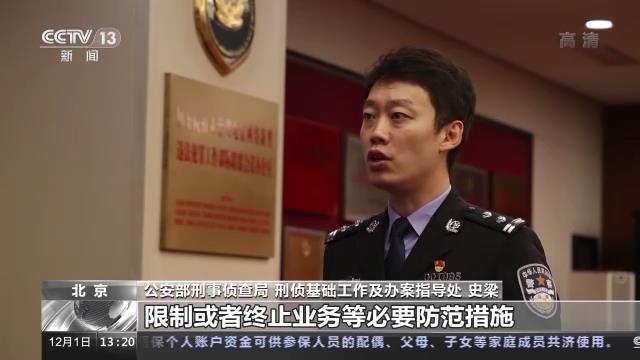People’s Republic of China (PRC) Anti-Telecommunication Network Fraud Law came into effect on December 1st.
The anti-telecommunication network fraud law adheres to the source management and comprehensive management, aiming at building a comprehensive firewall against telecommunication network fraud.
There are 7 chapters and 50 articles in the anti-telecommunication network fraud law, including general provisions, telecommunication governance, financial governance and Internet governance. This law will come into effect on December 1st. As a special legislation for small incision, this law adheres to the problem-oriented principle, and provides for key links and major systems according to practical needs. While strengthening the grasp of the end, more emphasis is placed on grasping the front end to prevent problems before they happen.
The law clearly defines the preconditions for the opening and closing of bank cards and telephone cards, and explicitly prohibits the illegal manufacture, sale, provision or use of related equipment and software. The relevant departments have the right to decide not to leave the country, etc., for those who have been defrauded by telecommunication networks and those who are suspected of major fraud in going to key areas and leaving the country.
More clearly define the conditions for handling and disabling bank cards and calling cards.
Telecommunication network fraud can not be separated from two cards, that is, bank cards and telephone cards. The anti-telecommunication network fraud law has further clarified the conditions for handling and stopping the two cards.
The anti-telecommunication network fraud law stipulates that the number of calling cards, bank accounts and payment accounts cannot exceed the limit. Operators and banks have the right to strengthen verification or refuse to handle abnormal card opening and account opening.

Shi Liang, Criminal Investigation Basic Work and Handling Guidance Department of Criminal Investigation Bureau of Ministry of Public Security;The anti-telecommunication network fraud law emphasizes the implementation of real-name registration system. Telecom enterprises, banks and payment institutions have the right to strengthen verification and refuse to open cards or accounts in case of abnormal card opening. For fraudulent abnormal calling cards, telecom enterprises will verify the users’ real names. If the verification fails or fails, the functions of related calling cards can be restricted or suspended. For fraudulent abnormal accounts and suspicious transactions, banks and payment institutions will also take necessary preventive measures such as re-verifying identity, delaying payment settlement, restricting or terminating business.
In addition, no one can illegally buy, sell, lease or lend telephone cards, bank accounts, payment accounts and internet accounts, and illegal acts will be recorded in credit records, and at the same time, the functions of related cards, accounts and accounts will be restricted, and non-counter business will be stopped, new business will be suspended, and network access will be restricted.
Persons suspected of major fraud may not be allowed to leave the country.
The anti-telecommunication network fraud law clearly prohibits the illegal manufacture, sale, provision or use of relevant equipment and software. The relevant departments have the right to decide not to leave the country for those who have committed telecommunication network fraud and those who are suspected of major fraud when going to key areas or leaving the country.
The anti-telecommunication network fraud law clearly stipulates that it is illegal and criminal to illegally manufacture, buy, sell and use virtual dial-up devices such as GOIP and Cat Pool, and dial-up connection devices for multiple users.
Persons who are criminally punished for engaging in telecommunication network fraud activities may be restricted from leaving the country within a certain period of time. For those who go to areas where telecommunication network fraud activities are serious, the immigration management agency may decide not to allow them to leave the country if they are suspected of major telecommunication network fraud activities.
Shi Liang, Criminal Investigation Basic Work and Handling Guidance Department of Criminal Investigation Bureau of Ministry of Public Security;Personnel engaged in telecommunication network fraud activities shall bear civil liability in addition to criminal and administrative responsibilities according to law, if they cause damage to others. Financial, telecommunications and Internet enterprises that violate the provisions of this Law and cause damage to others shall also bear civil liability in accordance with the relevant provisions of the Civil Code.
Encourage the research and development of counter-measures against telecommunication network fraud.
The anti-telecommunication network fraud law stipulates that telecommunications, banks and other institutions must constantly improve their research on telecommunication network fraud countermeasures to detect abnormal information activities, and at the same time require Internet companies to do a special duty of risk prevention and control and protect the collected information.
Strengthening countermeasures is the key and difficult point to prevent telecommunication network fraud. The anti-telecommunication network fraud law clearly stipulates that the state supports telecom operators, banking financial institutions and other practitioners to research and develop counter-measures for telecommunication network fraud for monitoring, identifying, dynamically blocking and disposing of fraudulent abnormal information and activities.

Li Xueying, member of the Standing Committee of china computer federation Computer Security Committee:Telecommunication network fraud is a technical crime, and the characteristics of using technology against supervision are very prominent. All industries must systematically build their own anti-fraud capabilities by constantly improving relevant technologies such as risk identification, early warning, traceability and exception handling, so as to improve the anti-fraud effect and overall ability level of the whole industry.
The anti-telecommunication network fraud law emphasizes Internet governance, requires Internet service providers to perform special obligations of risk prevention and control, and stipulates corresponding legal responsibilities.

Fan Yuan, member of the Standing Committee of china computer federation Computer Security Committee:For related enterprises, there is a certain overlap in fulfilling anti-fraud risk prevention and control obligations, network security obligations, data security protection obligations and personal information security protection obligations, so it is necessary to build a comprehensive and integrated compliance system in practice.
Citizen’s personal information is the basic tool of telecommunication network fraud crime, which can always accurately target the fraud object. The anti-telecommunication network fraud law clearly stipulates that the relevant personnel and units responsible for information leakage will be investigated according to law, and information collectors are required to do a good job in information protection.
Li Xueying, member of the Standing Committee of china computer federation Computer Security Committee:Information collectors should clear the personal information they have. It is necessary to establish a sound information protection management system, set up corresponding organizations and deploy powerful technical means. Among them, the technical means include auditing, monitoring, tracing and managing the use of information, and effectively discovering, protecting and disposing of information theft and attacks.
关于作者